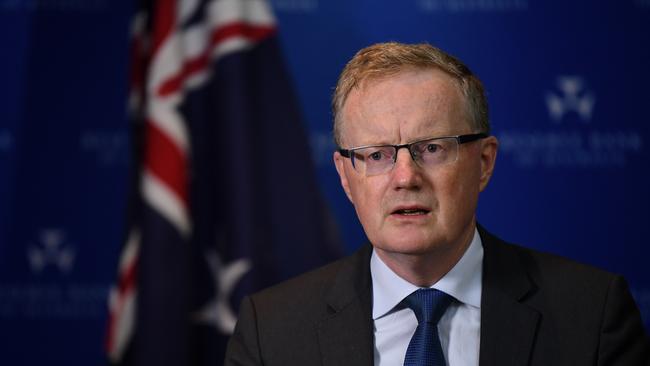Coronavirus: RBA’s Philip Lowe urges paying JobKeeper subsidies for longer
Reserve Bank governor Philip Lowe has warned that a ‘premature’ withdrawal of fiscal stimulus could damage the recovery.

Josh Frydenberg says the federal government will “do whatever it takes” to rebuild the economy after Reserve Bank governor Philip Lowe warned that a “premature” withdrawal of fiscal stimulus could damage the recovery.
Dr Lowe’s candid comments at a Senate committee hearing in Canberra on Thursday come amid an increasingly heated debate about whether key emergency support measures such as the $70bn JobKeeper program should be extended in some form beyond the September 30 deadline.
The RBA governor said the end of the JobKeeper, expanded JobSeeker and bank repayment deferrals was “clearly going to be a critical point for the economy”.
“Ending that fiscal support prematurely could be damaging,” Dr Lowe said.
“The key observation is that the world is very uncertain, and I think it’s too early to say what it’s going to be, what the economy is going to be like, in four months’ time.
“But if we have not come out of the current trough in economic activity, there will be, and there should be, a debate about how the JobKeeper program transitions into something else, whether it’s extended for specific industries or somehow tapered.”
The Treasurer told The Australian on Thursday that “our government will continue to do whatever it takes to keep Australians in jobs and businesses in business”.
The wage subsidies and expanded welfare payments were “designed to be temporary, targeted and proportionate to the challenge we face so that we can ensure Australia bounces back stronger on the other side and without undermining the structural integrity of the budget,” Mr Frydenberg said. “Australia’s success in flattening the curve means we can now begin to reopen our economy.
“Treasury estimates that as a result of easing the restrictions … GDP will increase by $9.4bn each month and see some 850,000 jobs ultimately restored.”
While Dr Lowe said he supported a potential “tapering” of support for certain industries “in four or five months”, he didn’t currently see the need to spend the $60bn in savings found because of a Treasury forecasting error.
He said he was somewhat encouraged by recent data, saying it was “entirely possible (the downturn) will not be severe as earlier thought”, although “much depends on how quickly confidence can be restored”.
“The past two months have been extraordinary ones in the life of our nation,” the governor said. “The outlook is incredibly uncertain, but things have tracked fractionally better than the baseline (forecast).”
Dr Lowe’s comments suggest a split between the Reserve Bank and Treasury about the risk of economic stimulus measures ceasing on October 1.
Last week, Treasury secretary Steven Kennedy told the same Senate committee that the cut-offs for JobKeeper and expanded JobSeeker support would not be “quite the cliff they look like”.
“The programs stop, but their effects don’t stop,” he said, adding that, like monetary policy, fiscal support “works with a lag” and the economic impact “actually builds for four to six quarters”.
Despite this, Mr Frydenberg and Dr Kennedy have flagged that the government is prepared to take a pragmatic approach to tapering-off support measures such as the JobKeeper program.
Both have said industries such as tourism could expect ongoing help if international borders remain closed as expected into 2021.
Treasury’s review of the Morrison government’s $130bn wage subsidy scheme will be presented as part of Mr Frydenberg’s economic update next month.
Major Australian businesses remain heavily dependent on financial support from the government. About three in four firms said they had accessed some form of emergency government support by the week starting May 13, according to a new Australian Bureau of Statistics report.
The report also showed that more than half of respondents had made use of wage subsidies, while nearly 40 per cent had accessed other forms of support.
Australian Banking Association chief Anna Bligh said on Thursday “nobody wants to see an ‘economic cliff’ at the end of the six-month period. The industry is working systematically to ensure a soft landing for the over 720,000 mortgage and business loans which have been deferred.”
ANZ’s head of retail banking, Mark Hand, said a large number of borrowers who had applied for emergency relief had suspended repayment obligations only as a precaution. Of those ANZ customers who had applied for relief and had their salaries paid into ANZ accounts, more than 80 per cent had experienced no change to their income at all, he said.
“If you think that less than 10 per cent of customers get the package and 80 per cent haven’t had any impact to their income, we are not talking a large number of customers.”
Even if the downturn proved more shallow than expected — Dr Lowe said he now expected a 15 per cent fall in hours worked against an earlier 20 per cent forecast — “there will still be a shadow cast by the pandemic and as a country we need to turn our minds to how best to move out of that shadow”.
Australian Chamber of Commerce and Industry chief executive James Pearson said the $60bn underspend on wage subsidies provided “greater scope to look at continued assistance to businesses and employees, especially in travel, tourism and events, who will still be profoundly impacted come September”.
He said “there will undoubtedly need to be economic stimulus to help businesses no longer directly impacted by COVID restrictions but struggling in a depressed economic environment.”




To join the conversation, please log in. Don't have an account? Register
Join the conversation, you are commenting as Logout